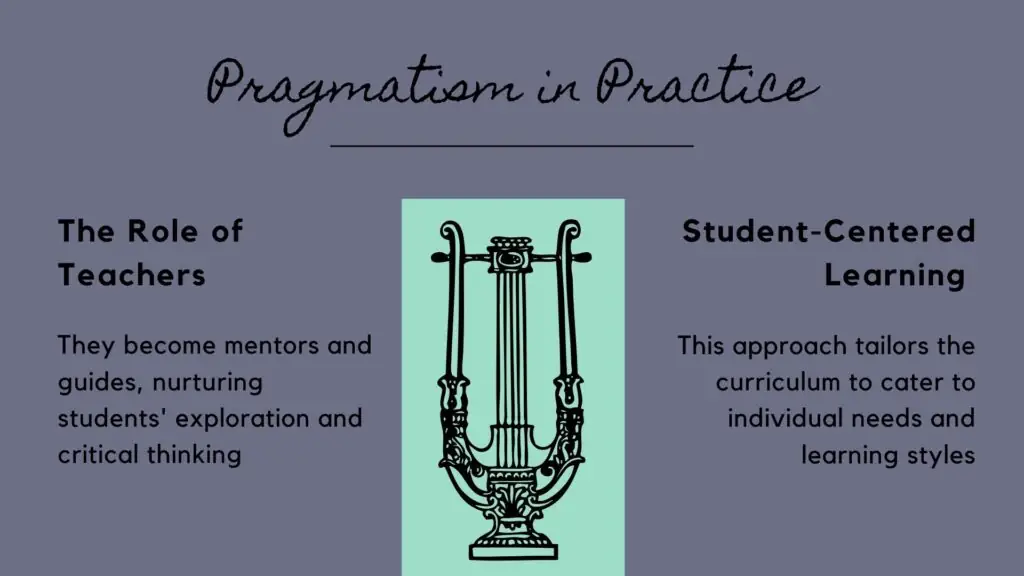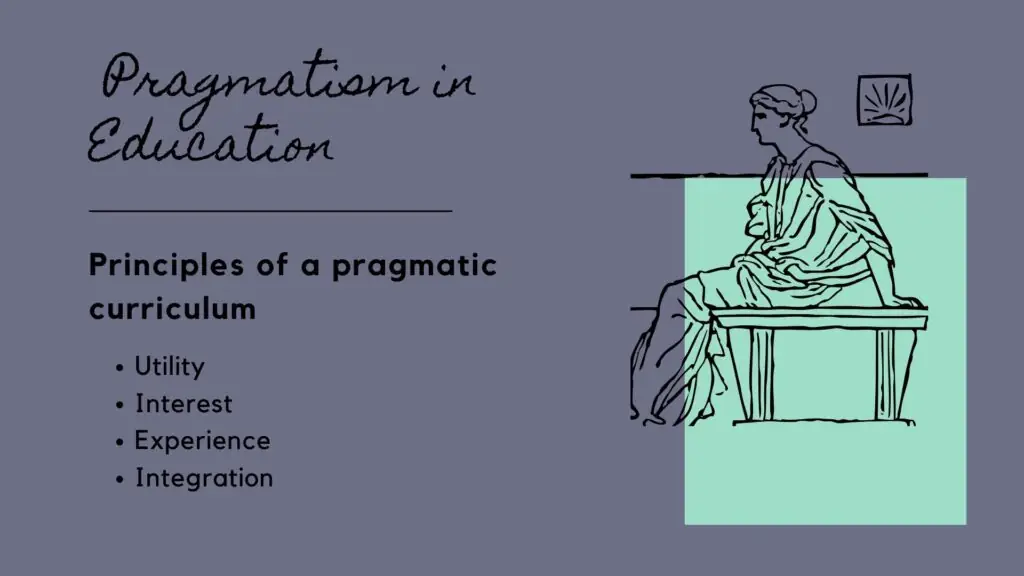In the constantly changing field of education, one philosophy has stood out as a guiding light for modern teaching methods: pragmatism in education. This approach strongly focuses on teaching practical skills and applying knowledge to real-life situations. In this guide, we will explore the importance of pragmatism in today’s education, the fundamental principles that support it, and how it influences the roles of both teachers and students.

✅ AI Essay Writer ✅ AI Detector ✅ Plagchecker ✅ Paraphraser
✅ Summarizer ✅ Citation Generator
History of Pragrmatism in Education
Pragmatism, a philosophical stance with profound implications for education, traces its roots to the core belief that the worth of ideas resides in their practical outcomes. At the forefront of this movement were John Dewey and William James, two influential pragmatists whose contributions have left an indelible mark on the field of education. Dewey and James both championed the notion that learning by doing and the acquisition of knowledge through direct experience were paramount to effective education.
John Dewey, a pioneering figure in pragmatism, contended that students learn best when actively engaged in the learning process. He believed that education should not be confined to the classroom but extend into real-world situations, allowing students to apply their knowledge in meaningful contexts. Dewey’s philosophy laid the foundation for hands-on, experiential learning, which remains a cornerstone of modern education.

William James, another luminary in the world of pragmatism, emphasized the pragmatic method’s inherent focus on problem-solving and adaptability. He recognized that students thrive when encouraged to explore and experiment, fostering a deeper understanding of complex concepts. James’s ideas underscored the importance of practicality in education, aligning closely with the pragmatic approach.

Together, Dewey and James championed an educational paradigm that prioritizes experience, action, and practicality. Their philosophies have left an enduring legacy, shaping the way educators approach teaching and learning in the present day. The dynamic and experiential approach they advocated continues to inspire educators worldwide, empowering students to not only acquire knowledge but also apply it effectively in the ever-evolving landscape of the real world.
Core Principles
Pragmatism in education is guided by several core principles:
- Experience-Based Learning: Learning through experience and real-life situations is central to pragmatism. It’s through these experiences that students gain practical skills.
- Problem-Solving: Pragmatism encourages students to tackle real-world problems. This approach fosters critical thinking and adaptability.
- Active Engagement: Learning isn’t passive in a pragmatic classroom. Students are actively engaged in the learning process, which leads to deeper understanding.
- Flexibility: Pragmatism is adaptable, allowing educators to tailor their approach to individual students’ needs.
The Philosophy of Pragmatism
Pragmatism finds its philosophical roots in the belief that the value of ideas lies in their practical consequences. John Dewey and William James, two influential pragmatists, emphasized the importance of learning by doing and the significance of experience in education. Their ideas laid the foundation for a dynamic and experiential approach to teaching.
To get the point of pragmatism, it’s helpful to contrast it with traditional educational approaches. Traditional education often prioritizes the memorization of facts and figures. In contrast, pragmatism focuses on the application of knowledge in real-world situations. This shift in emphasis leads to a profound transformation in how students perceive and engage with their education.
Benefits of a Pragmatic Teaching Style
The benefits of adopting a pragmatic teaching style are manifold. Students exposed to pragmatism are more likely to develop practical skills that serve them well beyond the classroom. They become adept problem-solvers, critical thinkers, and adaptable learners. Pragmatism equips students with the tools they need to thrive in an ever-changing world.
Pragmatism in Practice
Pragmatism in education transforms the traditional classroom into a dynamic arena where practical skills take center stage. This pedagogical approach places a premium on imparting skills that hold real-world relevance, such as problem-solving, effective communication, and critical thinking. Students no longer passively accumulate knowledge; instead, they engage in hands-on experiences that empower them to apply their learning effectively. Pragmatism bridges the gap between theory and practice, so that education serves as a springboard to real-life success.

The Evolving Role of Teachers
Within this transformative educational landscape, teachers assume a role akin to facilitators. Their role extends beyond the dissemination of information. The pragmatic teacher fosters an environment where students actively tackle real-world challenges, discovering the practical applications of their education. This shift empowers students to take ownership of their learning journey, ultimately enhancing their ability to navigate the complexities of life beyond the classroom.
Student-Centered Learning
At the heart of pragmatism lies the principle of student-centered learning. Recognizing the uniqueness of each student. It encourages students to explore their interests, fostering a deep and meaningful connection between their education and personal aspirations. Pragmatism transcends the one-size-fits-all approach, empowering students to become active participants in their educational experience and equipping them with the skills they need to thrive in an ever-changing world.
Types of Pragmatism in Education
Humanistic pragmatism celebrates the fulfillment of human needs and aspirations. It recognizes that education should not only equip students with practical skills but also contribute to their personal growth and well-being. This approach values the holistic development of individuals.
Experimental pragmatism takes a hands-on approach to truth and knowledge. It asserts that concepts and principles should be tested and verified through experimentation. In the classroom, this means encouraging students to explore, experiment, and discover truth through their own experiences.
Implementing Pragmatism in the Curriculum
A pragmatic curriculum is guided by several key principles:

- Curriculum content should be useful and applicable to students’ lives.
- Learning should capture students’ interests, making education engaging and relevant.
- Curriculum should integrate students’ real-life experiences, fostering deeper understanding.
- Subjects should be integrated, allowing students to see the connections between different areas of knowledge.
A pragmatic curriculum creates a dynamic and relevant educational program that prepares students for the real world. It equips them with practical skills while engaging their curiosity and creativity. It makes sure that education is not just a means to an end but a lifelong journey of learning.
Conclusion
In the landscape of modern education, pragmatism stands as a powerful philosophy that equips students with practical skills, fosters critical thinking, and prepares them for the complexities of the real world. By embracing pragmatism in education, we empower students to not only learn but also apply their knowledge in meaningful ways, ultimately shaping them into capable and adaptable individuals ready to face the challenges of professional life. Through pragmatism, we bridge the gap between theory and practice, paving the way for a brighter educational future.
FAQ
Follow us on Reddit for more insights and updates.





Comments (0)
Welcome to A*Help comments!
We’re all about debate and discussion at A*Help.
We value the diverse opinions of users, so you may find points of view that you don’t agree with. And that’s cool. However, there are certain things we’re not OK with: attempts to manipulate our data in any way, for example, or the posting of discriminative, offensive, hateful, or disparaging material.